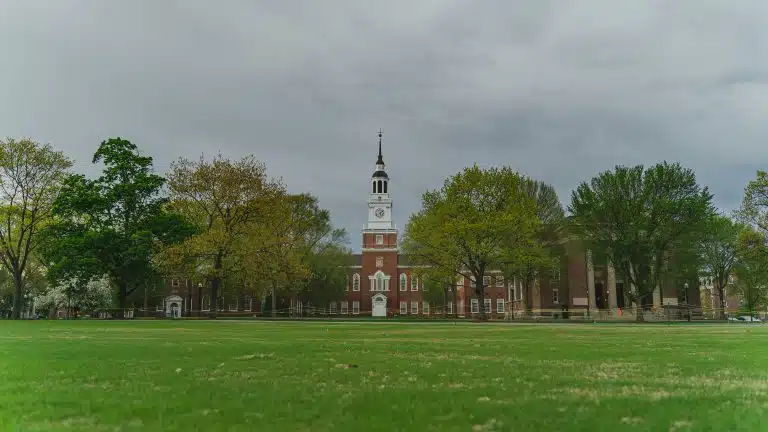Dartmouth College is known for many great qualities: its D-Plan flexibility, thriving a cappella scene, and snowy Appalachian backdrops. But despite being one of the eight Ivy League schools, you don’t hear its name as often as Harvard or Yale. That might leave you wondering: Is Dartmouth College Ivy League?
For some, Dartmouth doesn’t “feel” like an Ivy, but that’s only because it breaks the typical Ivy mold. Yet, its prestige, competitiveness, and legacy speak for themselves. So, if you’re considering Dartmouth as your target Ivy, here’s everything you need to know—from its official Ivy League status to where it stands among other Ivies!
- What Makes Dartmouth College an Ivy League School?
- Dartmouth College vs. Ivy League: National and World Rankings
- Ivy League Acceptance Rates: Where Does Dartmouth Stand?
- Frequently Asked Questions
- Takeaways
What Makes Dartmouth College an Ivy League School?
If you’ve ever wondered if Dartmouth College is an Ivy League school, the answer is simple: yes, it is. While it may not be as widely popular as its Ivy counterparts, it continues to stand out as one of the most sought-after schools in the U.S.
With over 31,000 aspiring Dartmouth students vying for a spot in the Class of 2028, it’s clear that despite its smaller size and unique academic approach, Dartmouth College’s Ivy League status remains as strong as ever.
While the Ivy League includes eight prestigious institutions—Harvard, Yale, Princeton, Columbia, UPenn, Brown, Cornell, and Dartmouth—each has defining characteristics contributing to its Ivy status. Dartmouth’s identity is primarily shaped by:
- Personal learning experience. With a 7:1 student-to-faculty ratio, you’re not just a face in the crowd. Dartmouth fosters close mentorship, hands-on learning, and strong professor-student relationships, making your education more engaging and interactive.
- Rural setting. While most Ivy League schools are in major cities, Dartmouth is situated in a rural setting. Its Hanover, New Hampshire campus offers a close-knit student body, access to the great outdoors, and unique learning experiences beyond the classroom.
- Strong research & innovation. Despite its size, Dartmouth is an R1 research institution, ranking 51st in U.S. patent grants in 2023. Its research drives advancements in healthcare, energy, and environmental sustainability.
- Distinct graduate programs. While Dartmouth is one of the few Ivies without a law school, it is home to the Tuck School of Business, the world’s first graduate school of management, and the Thayer School of Engineering, one of the oldest engineering schools in the U.S.
With this, Dartmouth may not always be the first Ivy that comes to mind, but its tight-knit environment, emphasis on real-world learning, and distinct academic approach reinforce its reputation as a true Ivy League institution.
Dartmouth College vs. Ivy League: National and World Rankings
While Dartmouth is undoubtedly part of the Ivy League, how does it compare to its peers? All eight Ivy League institutions may share a reputation for academic excellence, but their national and global rankings highlight key differences in visibility, research output, and overall influence.
US News and World Report
If you’re looking to see how Dartmouth stacks up against other colleges in the U.S., the US News and World Report national rankings provide a strong benchmark. These rankings, which consider key factors like academic reputation, graduation rates, and faculty resources, can give you a clear sense of how schools compare.
Here’s how Dartmouth compares to its Ivy League counterparts in the 2025 rankings:
| Ivy League Schools | National Ranking (2025) |
| Princeton University | #1 |
| Harvard University | #3 |
| Yale University | #5 |
| University of Pennsylvania | #10 |
| Cornell University | #11 (tie) |
| Brown University | #13 (tie) |
| Columbia University | #13 (tie) |
| Dartmouth College | #15 (tie) |
Although Dartmouth’s rankings place it lower than some Ivy League peers, its consistent top 15 placement reflects its strong academic reputation and commitment to undergraduate education.
This ranking further reinforces Dartmouth College’s Ivy League status, showing that despite differences in national rankings, it remains one of the most respected institutions in the U.S. This makes Dartmouth a standout choice if you’re looking for strong undergraduate education and faculty engagement.
Times Higher Education (THE)
The Times Higher Education (THE) rankings offer a broader perspective if you’re looking at how Ivy League schools perform globally. While they assess teaching quality, research impact, and reputation, Ivy League schools don’t always rank the same internationally as they do in the U.S., as global placements vary based on research output and international collaborations.
Here’s how Dartmouth, as well as other Ivy League schools, ranks globally:
| Ivy League Schools | THE World Ranking (2025) |
| Harvard University | #3 |
| Princeton University | #4 |
| Yale University | #10 |
| University of Pennsylvania | #14 |
| Columbia University | #18 |
| Cornell University | #20 |
| Brown University | #58 |
| Dartmouth College | #168 |
While well-regarded nationally, Dartmouth ranks significantly lower on the global stage, placing #168 in the rankings—far behind Ivy peers like Harvard (#3) and Princeton (#4). While Dartmouth makes meaningful research contributions, its lower ranking reflects its smaller research footprint, fewer international partnerships, and an emphasis on undergraduate education over large-scale global research.
However, what Dartmouth lacks in ranking, it makes up for in impact. Specialized programs like Environmental Studies and Native American Studies can allow you to apply your learning to real-world challenges and make a direct difference in the community.
Although Dartmouth’s ranking is lower globally, its focus on teaching, mentorship, and hands-on learning reinforces its elite status in ways rankings can’t measure.
QS World University Rankings
Similar to THE rankings, the QS World University Rankings evaluate universities globally, emphasizing academic reputation, employer recognition, and international diversity. However, these key factors often favor large research institutions with strong international networks and can influence how Ivy League schools compare worldwide.
Considering this, let’s take a closer look at how Dartmouth compares globally in the 2025 rankings:
| Ivy League Schools | QS World University Rankings (2025) |
| Harvard University | #4 |
| University of Pennsylvania | #11 |
| Cornell University | #16 |
| Princeton University | #22 |
| Yale University | #23 |
| Columbia University | #33 |
| Brown University | #79 |
| Dartmouth College | #243 |
While Dartmouth doesn’t match the global standing of Ivy peers like Harvard (#4), UPenn (#11), and Cornell (#16), its lower ranking reflects its focus on undergraduate education and applied research over large-scale global collaborations. This reflects its commitment to environmental sustainability, healthcare innovation, and social sciences, emphasizing hands-on learning over global research dominance.
Still, Dartmouth allows you to work on real-world projects through faculty-driven research and experiential learning. Whether it’s environmental field studies or health policy research, you’ll engage in meaningful academic work beyond the classroom.
Despite ranking lower globally, Dartmouth College’s Ivy League status remains strong. After all, its immersive, community-driven education continues to attract top students seeking a top-tier Ivy League experience that combines academic excellence with a tight-knit, collaborative environment.
Ivy League Acceptance Rates: Where Does Dartmouth Stand?
Now that you’ve explored how Dartmouth compares to other Ivy League schools in national and global rankings, another key factor to consider is acceptance rates. Getting into an Ivy League school is no easy feat, with most admitting only a small percentage of applicants. But how does Dartmouth compare in selectivity?
Here’s a closer look at how Dartmouth’s acceptance rate measure up against other Ivy League schools:
| Ivy League Schools | Overall Acceptance Rate | Early Decision/Early Action (EA) Acceptance Rate | Regular Decision (RD) Acceptance Rate |
| Princeton University | 4.6% | Undisclosed | Undisclosed |
| Harvard University | 3.6% | 8.7% | 2.7% |
| Yale University | 3.7% | 9% | 3.1% |
| University of Pennsylvania | 5.4% | TBA | TBA |
| Columbia University | 3.9% | 11.9% | 3% |
| Cornell University | 8.4% | 16.7% | 6.2% |
| Brown University | 5.2% | 14.4% | 3.9% |
| Dartmouth College | 5.3% | 17.1% | 3.8% |
Let’s look at Dartmouth’s acceptance rates and what they mean for applicants:
1. Dartmouth is moderately selective within the Ivy League.
With a 5.3% overall acceptance rate, it sits in the middle range of Ivy selectivity. While its rate is slightly higher than some peers, gaining admission remains extremely competitive, even for top applicants.
2. Applying Early Decision gives you a significant advantage.
With an Early Decision (ED) acceptance rate of 17.1%—the highest among the Ivies listed—Dartmouth offers a clear benefit for early applicants. If Dartmouth is your top choice, applying through ED could greatly improve your chances.
3. Regular Decision remains highly competitive.
Dartmouth’s 3.8% Regular Decision (RD) acceptance rate is slightly higher than Princeton, Yale, Columbia, and Cornell but remains incredibly selective. If you’re applying for RD, you’ll face steep competition, but the gap between Early and Regular Decision acceptance rates shows why applying early can give you a strategic advantage.
Frequently Asked Questions
1. Is Dartmouth a prestigious college?
Yes! Dartmouth is a highly prestigious Ivy League institution known for its strong academics and selective admissions. While it may not have the same global visibility as Harvard or Yale, its undergraduate-focused education, hands-on learning, and tight-knit community make it one of the most respected universities in the U.S.
2. What is Dartmouth’s acceptance rate?
For the Class of 2028, Dartmouth’s acceptance rate sits at 5.3%, making it one of the most selective universities in the country. But if Dartmouth is your top choice, applying Early Decision could work in your favor. Its Early Decision (ED) acceptance rate is 17.1%, significantly higher than the 3.8% for Regular Decision (RD), giving you a more competitive edge in securing your spot.
3. How does Dartmouth compare to other Ivy Leagues?
Like its Ivy League peers, Dartmouth is known for its academic prestige and selectivity, but what sets it apart is its smaller student body, strong undergraduate focus, and rural setting in Hanover, New Hampshire. While it ranks lower globally than some Ivies due to its emphasis on hands-on learning over large-scale research collaborations, it remains one of the top-ranked institutions in the U.S.
4. Where is Dartmouth College?
Dartmouth College is located in Hanover, New Hampshire, a rural town known for its scenic beauty and outdoor adventures. Whether you’re hiking and backpacking with the Dartmouth Outing Club (DOC) or kayaking with the Ledyard Canoe Club, Dartmouth’s strong outdoor culture gives you the chance to experience nature firsthand while building a tight-knit community beyond the classroom.
5. Why are they called Ivy League schools?
The Ivy League began as an athletic conference in 1954, bringing together eight prestigious universities: Harvard, Yale, Princeton, Columbia, Penn, Brown, Cornell, and Dartmouth. But the term has since become synonymous with academic excellence, prestige, and selectivity.
Takeaways
Dartmouth College is an Ivy League school, and here’s what you need to know:
- Dartmouth has a strong academic reputation, tight-knit community, and undergraduate focus. While not as globally recognized as some Ivies, its immersive, student-centered education sets it apart.
- Dartmouth ranks highly but not at the top among Ivies. While it consistently places in the top 15 nationally, its global ranking is lower due to its smaller research footprint and international visibility than larger Ivy League schools.
- Dartmouth is highly selective but slightly more accessible than the most competitive Ivies, with a 5.3% overall acceptance rate. However, students applying Early Decision benefit from significantly higher acceptance odds at 17.1%.
- As the smallest Ivy and one of the few in a rural setting, Dartmouth offers a distinct learning environment. With its tight-knit community and strong outdoor culture, it provides a unique Ivy League experience.
- Need help navigating your Dartmouth admissions process? With its high selectivity and Early Decision advantage, working with an admissions expert can help you refine your application, highlight your strengths, and earn your spot at Dartmouth.

Eric Eng
About the author
Eric Eng, the Founder and CEO of AdmissionSight, graduated with a BA from Princeton University and has one of the highest track records in the industry of placing students into Ivy League schools and top 10 universities. He has been featured on the US News & World Report for his insights on college admissions.














